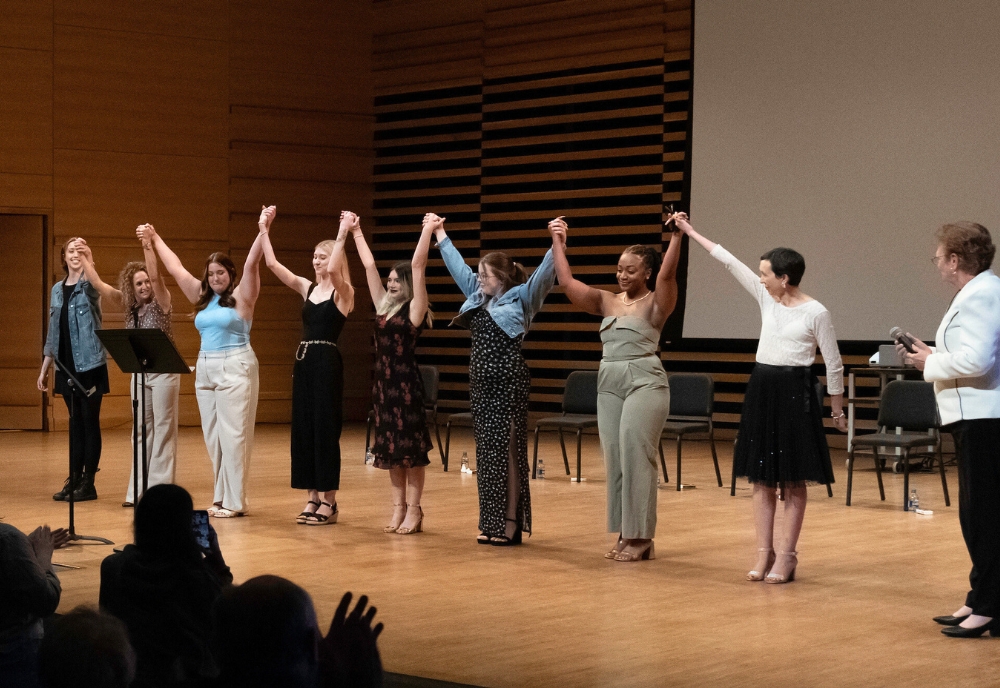May is Mental Health Awareness Month
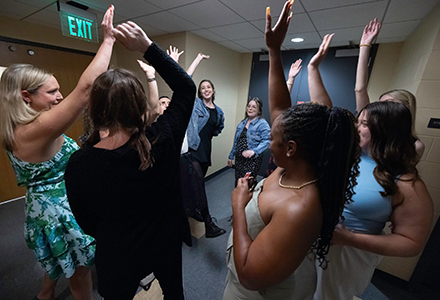
Performers share a moment of connection backstage. (Photo by Laura Lyon Photography)
Three College of Arts and Sciences students participated in ‘This Is My Brave – College Edition at USF,’ directed by the USF College of Behavioral and Community Sciences (CBCS) assistant professor Dr. Kristin Kosyluk in April at the USF Music Concert Hall at the School of Music.
The free public performances showcased the lived experiences of USF students sharing their first-hand accounts of coping with mental illness or addiction in an effort to eliminate stigma among college students.
This year’s show also included feature remarks by former NFL player, Super Bowl champion, and USF alumnus BJ Daniels.
Psychology students Kaitlyn Hadcock and Rhaia Roscoe, as well as international affairs student Moriah Haley performed in this year’s show.
Bringing obsessive-compulsive disorder out of the dark
“When I saw the advertisement for the showcase, I had just reached the six-month benchmark of my recovery,” said Moriah Haley, who performed a spoken word poem she wrote about their experience in recovery from obsessive-compulsive disorder (OCD).
“An integral part of this journey for me has been openness about the disorder, especially since so many people suffer in silence from OCD, in particular. The more confident I became in my recovery, the more emboldened I felt to encourage others to seek treatment. This Is My Brave was a big step, but a necessary one.”
Haley said they are grateful for the movement to destigmatize mental illness and normalize mental health practices, but found that much of the messaging has been directed to disorders that are “neatly understood.”
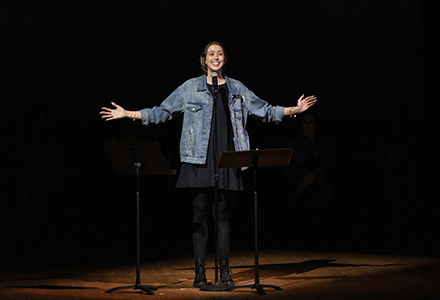
International affairs master’s student Moriah Haley. (Photo by Laura Lyon Photography)
“When people first learn about the intricacies of OCD, they are frightened, though not even a fraction as frightened as those who have the disorder. Mental health should not only include well-known disorders that can be simplified into a ‘just do ___’ statement. Those left to the wayside must also be considered, and greater knowledge of these disorders will, in turn, normalize the therapeutic practices and medications that heighten wellbeing,” they explained.
Haley credits therapy as a life-changing experience in helping them to overcome OCD.
“My current therapist has been the first to challenge me rather than gawk at my emotional intelligence and vast introspection,” they explained. “These traits had kept me from being treated in the past since most therapists believed that awareness of self was equivalent to healing of self. My current therapist saw through my habits immediately and threw me into the deep end of Exposure Response Prevention (ERP) therapy. At first, I was bitter towards her. ERP is a vicious, exhausting practice. But soon enough, when the practice began to take effect, I was left with the raw emotions my OCD had been hiding from me for years, and the same therapist who pushed me into the deep end was wading with me through tears I should have cried long ago. My therapy tandem with my medication, I feel more like myself today than I ever have in my entire life.”
Haley’s message to others with OCD is to realize the impact of each small step toward recovery.
“‘Better’ isn’t always a feeling,” they said. “I spent a good portion of my life dreaming about what I would do once I was ‘better,’ once the OCD had disappeared completely. To learn early in my recovery that OCD was a disability, and there was not going to be a life for me where I was without it, I began to lose hope of the ‘better’ I’d dreamed of and mourned the life I’d been reaching for all along. But ‘better’ is far from a feeling, it’s a practice. Every time we wake up and put our feet on the ground, we are better than yesterday by the sheer fact of yesterday being behind us. When we begin to invest in the small seemingly insignificant acts of betterment, we’ll start to feel it. The life I had been dreaming of living, I was already living it.”
For Haley, taking part in This Is My Brave reminded them that one is never truly “alone” in their experience with mental illness and that there are many others who can relate.
“I was struck with the familiarity of the performances I had heard before contrasted with the pleasant shock of the new, both of which were so profound that I couldn’t help but tear up. I am reminded of the old adage in mental health: ‘You are not alone.’ It is hard to believe this when you are lying in your bed watching the hours tick by, or even when you’re out with your friends where bringing up the hard times would only bring everybody down. But in an environment like This Is My Brave, it is impossible to feel alone,” Haley said.
After completing their master’s degree from CAS, Haley hopes to continue their educational journey by earning a PhD in Middle East/North African Studies. Haley also plans to continue bringing awareness of OCD.
“I hope to write and speak in various capacities, continuing my mission of bringing those with OCD out of the darkness of popular assumptions and into the light of true understanding,” they said.
Overcoming trauma and finding hope
Kaitlyn Hadcock said choosing to major in psychology with a minor in behavioral healthcare from CBCS was something she knew she wanted to do since her freshman year in high school.
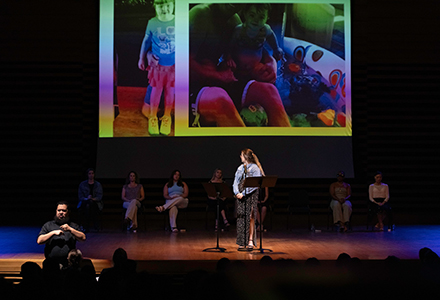
Psychology student Kaitlyn Hadcock shares memories from her childhood. (Photo by Laura Lyon Photography)
“Growing up, I was surrounded by abuse, neglect, mental illnesses, divorce, numerous family deaths, and a family member who had Alzheimer’s disease,” she explained. “Because of these circumstances, I wanted to learn more about psychology, why my family members are the way they are, and how to help those in similar situations. I am extremely dedicated to underprivileged populations and mental health.”
She shared a personal narrative written piece about her healing journey with prior traumatic events, which includes being a domestic violence survivor.
“Mental health is extremely important. People do not realize that without good mental health you do not have good physical health and vice versa. Mental health should always be the first priority. It is also hard to truly understand the importance of mental health without being educated on it, or actively thinking about it. You can easily spiral quickly if you do not have the right support system, tools, or resources,” Hadcock said.
Her message to others coping with a similar mental illness as her is to remain hopeful.
“I always want to reassure people that there is a light at the end of the tunnel. I would also tell them that I know they don’t believe that because I didn’t either. I always felt like I was in a jail cell, and that I wouldn’t be able to see myself turn 18. It’s easy to feel hopeless, but it’s important to continue to give yourself goals to increase the feelings of hope and faith,” she said.
Hadcock has been going to therapy for six years, starting when she turned 14 years old.
“Due to the trauma I endured, I had to reconstruct the way my brain thinks such as figuring out what is realistic versus unrealistic, changing negative thoughts into positive ones, and going out in nature or taking walks to clear my head. My therapist has given me a lot of cognitive, behavioral, and mindfulness-based strategies to reduce my neurotic tendencies and to see the world realistically. I continue to use all these tools daily.”
She said being able to share her narrative piece in This Is My Brave helped to shine a light on the reality that mental illness is not unique to just a few.
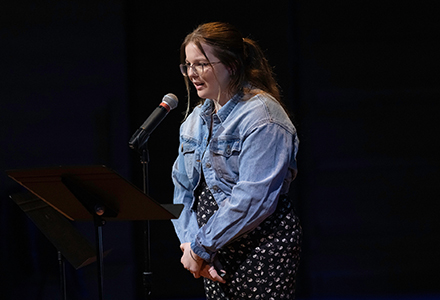
Psychology student Kaitlyn Hadcock shares memories from her childhood. (Photo by Laura Lyon Photography)
“Growing up, I would always tell my friends about my traumatic memories, and they would feel guilty, be speechless, or not react at all. I felt like I would always receive negative responses, and I felt like an outsider. I would ask myself, ‘Why am I so different? Am I unlovable?’ Yet, being a part of this experience made me feel like a regular person. I got to see the raw version of other people who also went through traumatic events, and it created a special support system for me.”
After she graduates, Hadcock hopes to pursue a master’s degree and earn licensure to become a licensed therapist helping adolescents going through mental illness.
“This Is My Brave is more than just an event or a performance. It is a milestone or a life changer. While I was going through domestic violence from my mom, my dad and grandpa had to watch me go through that pain in silence because they didn’t want to get legal action involved if they lost me. They also went through abuse from my mom as well. My dad and grandpa both came to my performance, and they were speechless. I could feel that they also found internal peace with the situation too. It was a surreal process to experience, and I will never forget it.”
Learn more about resources available to students struggling with mental illness from the USF Counseling Center.
